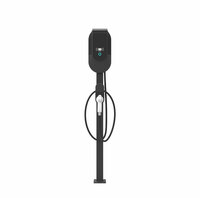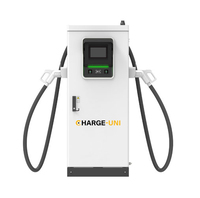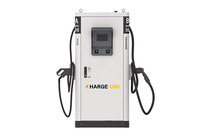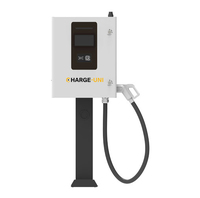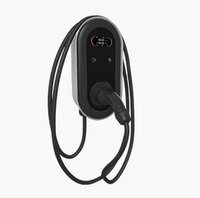GB/T EV Charger
Product Quick Detail
- FOB Price
- USD $20,000.00 / Piece
- Minimum Order
- 1
- Place Of Origin
- China
- Packaging
- N/A
- Delivery
- 30-45 days
Specifications
Charge-Uni AC and DC products comply with the GB/T 18487.1-2015 standard. The AC Charger comes with compact size and simple design, and customers can choose wall-mounted or stand-pillar
installation. The DC charger has a power of up to 180 kW, which further reduces charging time and improves overall charging efficiency.
GBT Charging Standard
GB/T 20234.1-2015 stipulates the definition, requirements, test methods and inspection rules of the connecting device for conductive charging of electric vehicles. This standard applies to charging
connection devices for conductive charging of electric vehicles, which:
① AC rated voltage not exceeding 690V, frequency 50Hz, rated current not exceeding 250A;
② DC rated voltage not exceeding 1000V, rated current not exceeding 400A. If the power supply interface of the charging connection device uses standardized plugs and sockets in accordance with
GB2099.1 and GB1002, this standard does not apply to these plugs and sockets.
GBT Charger Compatibility
GBT charging piles are suitable for all electric vehicles on the Chinese market. If it is an imported model, a GBT adapter may be required.
GB/T EV Charger Advantages
GB/T AC/DC products have a charging data management function to ensure the integrity and security of the customer's charging data. The product's emergency stop button is designed to cut off the
power supply from the power circuit in case of emergency to prevent the failure. CU products are all supported by credit cards, WeChat, Alipay, and other activation mode.
Difference between AC and DC GB/T EV Charger
As the electric system of an EV is a DC system, the AC power is not able to charge the power battery directly during AC charging, it needs to pass through a component called On-board Charger (OBC),
which performs AC to DC conversion and is then supplied to the power battery after the voltage is transformed according to the command of the BMS.
In the case of DC charging, the DC pile itself is an AC/DC rectifier and DC/DC transformer, which can be converted from AC to DC directly outside the vehicle according to the needs of the BMS,
replacing the role of the on-board charger, hence the DC pile is also known as a non-on-board charger.
GBT EV Charger Characteristics
Charging interface is a "nine-hole" design, the picture shows the DC charging gun head. The top middle CC1 and CC2 are used for electrical connection confirmation, while S+ and S- are the
communication lines between the off-board charger and the electric vehicle. The two largest holes, DC+ and DC-, are used for charging the battery pack and are high current lines; A+ and A- are
connected to the off-board charger and provide low voltage auxiliary power for the electric vehicle, with earth at the very center.
As a professional ev car charger factory, CHARGE-UNI TECHNOLOGY has high-quality ev charger for sale. Welcome to contact us if needed.
- Country: China (Mainland)
- Business Type: Manufacturer
- Address: 169-28 Wuhou Street, Jianye District, Nanjing
- Contact: charge-uni com


